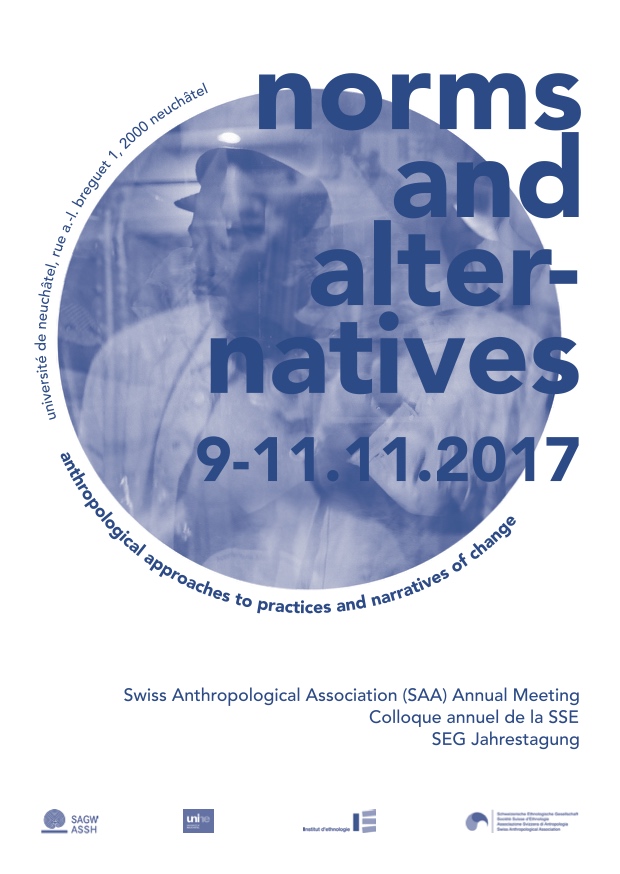Norms and Alternatives Anthropological approaches to practices
and narratives of change
SEG Jahrestagung
Colloque Annuel de la SSE
Annual Meeting of the SAA
Neuchâtel, 9-11.11.2017
The Scientific Commission of the Swiss Anthropological Association (SSE-SEG-SAA) convenes once a year a major conference around thematic panels. This year, the annual meeting of the SSE-SEG-SAA will address the topic of “norms and alternatives”.
While the end of the 20th century has often been described as the end of history with the triumph of the Western democracies model, the last two decades have been characterized by renewed narratives of change, which turn around a sense that our global system of production and consumption has reached its limits. Within the civil society, and amongst certain key economic and political players worldwide, an increasing number of actors are promoting “alternatives” either to bring about, in the name of sustainability or social justice, smooth institutional change within existing paradigms (e.g. fair trade certification), to contest in a more radical way a society based on mass consumption and productivism (e.g. degrowth movements, alter-globalization, etc.), or to get already prepared to what is described as imminent and unavoidable collapse (as with “resilient” strategies for coping with climate change). These so-called alternatives are as open-ended as are the debates about the exact nature of change, its goals, and the ways to implement it. Although they are not new and often rearticulate in new ways long-lasting practices, they are enjoying a growing celebrity with a large coverage in the media. Accusations of naïve utopianism are directed to the most radical propositions. At the same time, more consensual initiatives are criticized for their proximity with dominant models, often characterized as neoliberal, postcolonial or simply nefarious.
The conference aims to encourage critical approaches to the concept of alternative and its
materializations in concrete human projects. This idea of “alternatives” rests on the existence of supposedly dominant norms , and generally defines itself in opposition to them as if there were two separate "worlds". It produces a range of binaries that shape our understanding of reality: power -vs- oppression; conventional -vs- alternative; sustainable -vs- unsustainable, market economy -vs- social economy, etc. Anthropological perspectives challenge such simplifications: beyond normative categorizations, they look at the concrete and lived experience of humans in specific social contexts and highlight the always processual, plural and contested nature of norms and categories that regulate their activities. They invite us to understand alternatives less in their opposition and more in their relation and interaction with the so-called dominant norms, thus looking at the diverse ways in which they engage with the dominant social order. While highlighting the messiness and diversity of practices they may uncover, anthropological approaches can also help gain a better understanding of how such "alternatives" may still bring about social change, sometimes in subtle ways by diversifying existing institutions, or on the contrary, how they may unexpectedly reinforce the wider social order. Furthermore, the problem of justice and the critique of inequality, prejudice and violence are central to the discipline’s trajectory (be it from a human right based or a power oriented perspective), suggesting both the complexity and ambiguity of these processes and the difficulty we may have evaluating their social value. Related to the conference theme then is the question: what role can and should anthropologists play in the construction and de-construction of “dominant” norms and their “alternatives”?
